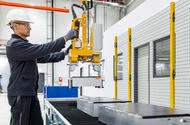The UK is gearing up to become a powerhouse in electric vehicle (EV) battery production, and a significant step in that direction is the establishment of a new integrated lithium-ion battery recycling and refining facility in Plymouth. This plant, developed by British company Altilium, is designed to produce essential materials for battery cells on an industrial scale, marking a pivotal moment in the nation’s ambition to lead in the EV sector.
### What’s Happening in Plymouth?
The Plymouth facility is part of Altilium’s comprehensive four-part strategy, which will ultimately culminate in a refinery on Teesside by the end of 2027. This refinery is expected to produce high-quality recycled cathode active material (CAM) for the UK’s gigafactories. In the meantime, the Plymouth plant will focus on generating recycled nickel mixed hydroxide precipitate (MHP) and lithium sulphate—key components for manufacturing battery cathodes across various industries.
The urgency behind this initiative is underscored by new regulations in the EU, which mandate that by 2031, all new EV batteries must contain a minimum level of recycled lithium, nickel, and cobalt. These requirements are set to increase further by 2036, pushing companies like Altilium to innovate and refine their processes for extracting and processing these critical materials.
### Why Is Domestic Battery Recycling So Important?
A recent government report highlights the necessity of securing a stable supply of critical minerals like lithium and cobalt for the UK’s economic growth and security. Currently, the country relies heavily on imports, particularly from China, to meet its mineral needs. The report suggests that recycling lithium-ion batteries from end-of-life EVs could potentially fulfill 39% to 57% of the demand for these minerals by 2040.
However, the economics of battery recycling can be tricky. Altilium’s spokesperson, Dominic Schreiber, emphasizes the importance of optimizing processes to make recycling cost-effective. The company is focused on scaling its operations while ensuring that every step is validated to minimize risks. Until the Teesside plant is operational, the Plymouth facility will serve as a crucial income generator by producing intermediate materials.
With major clients like Nissan and Tata Motors eyeing Altilium’s products for their gigafactories, the push for locally sourced materials is becoming increasingly relevant. As Schreiber points out, sourcing materials domestically not only reduces carbon footprints but also aligns with new EU regulations. Batteries made from recycled metals can have up to 74% fewer embedded emissions, making them a more sustainable choice.
### The Recycling Process: From Batteries to Black Mass
The recycling process begins with a third-party supplier that shreds used batteries and extracts valuable metals in a form known as black mass. This black mass is then refined by Altilium to produce the necessary materials for battery production. Interestingly, most of the feedstock comes from damaged or failed batteries rather than those that have reached the end of their life. The industry anticipates a significant increase in the number of end-of-life batteries entering the market post-2030, which could further boost recycling efforts.
Another player in the UK battery recycling scene is Recyclus Group, which recently dispatched 111 tonnes of black mass to Glencore, a global mining and recycling company. Recyclus has ramped up its operations since starting large-scale recycling in 2023, with plans to process 5,000 tonnes of batteries this year and a capacity for 22,000 tonnes. Co-founder Robin Brundle notes that the company has successfully harvested black mass and is now looking to refine it to a quality suitable for reuse in new EV batteries.
### The Future of Battery Recycling in the UK
The race to refine black mass into usable materials is heating up. Recyclus is developing a pilot plant in collaboration with an automotive company to achieve this goal. If successful, this initiative could coincide with a growing demand from car manufacturers for recycled materials, allowing them to reclaim and reuse components from their old batteries.
The landscape of battery recycling in the UK is evolving rapidly, with significant investments and innovations paving the way for a more sustainable future. As the country pushes towards its goal of becoming a leading hub for EV battery production, the focus on domestic recycling will play a crucial role in ensuring that the supply chain is both secure and environmentally friendly.
The big takeaway? The UK’s journey toward becoming a leader in EV battery production isn’t just about building new facilities; it’s about creating a sustainable ecosystem that prioritizes recycling and local sourcing. Start paying attention to these developments, and you’ll see how they shape the future of electric mobility in the coming years.

